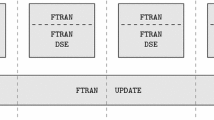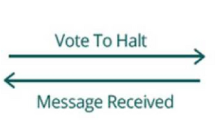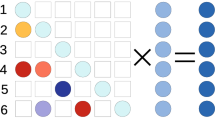Abstract
The Divide-and-conquer (D&C) pattern appears in a large number of problems and is highly suitable to exploit parallelism. This has led to much research on its easy and efficient application both in shared and distributed memory parallel systems. One of the most successful approaches explored in this area consists of expressing this pattern by means of parallel skeletons which automate and hide the complexity of the parallelization from the user while trying to provide good performance. In this paper, we tackle the development of a skeleton oriented to the efficient parallel resolution of D&C problems with a high degree of imbalance among the subproblems generated and/or a deep level of recurrence. The skeleton achieves in our experiments average speedups between 11 and 18% higher than those of other solutions, reaching a maximum speedup of 78% in some tests. Nevertheless, the new proposal requires an average of between 13 and 29% less programming effort than the usual alternatives.








Similar content being viewed by others
References
Aho, A.V., Hopcroft, J.E., Ullman, J.D.: The Design and Analysis of Computer Algorithms. Addison-Wesley, Boston (1974)
Aldinucci, M., Danelutto, M., Kilpatrick, P., Torquati, M.: FastFlow: High-Level and Efficient Streaming on Multicore, chap. 13, pp. 261–280. Wiley (2017)
Aldinucci, M., Danelutto, M., Teti, P.: An advanced environment supporting structured parallel programming in Java. Future Gener. Comput. Syst. 19(5), 611–626 (2003)
Ansel, J., Chan, C., Wong, Y.L., Olszewski, M., Zhao, Q., Edelman, A., Amarasinghe, S.: PetaBricks: A language and compiler for algorithmic choice. In: Proceedings of 30th ACM SIGPLAN Conference on Programming Language Design and Implementation, PLDI ’09, pp. 38–49. ACM (2009)
Avis, D., Fukuda, K.: Reverse search for enumeration. Discrete Appl. Math. 65(1), 21–46 (1996)
Ciechanowicz, P., Kuchen, H.: Enhancing Muesli’s data parallel skeletons for multi-core computer architectures. In: 12th IEEE Intl. Conf. on High Performance Computing and Communications, (HPCC 2010), pp. 108–113. IEEE (2010)
Cole, M.: Algorithmic Skeletons: Structured Management of Parallel Computation. MIT Press, Cambridge (1989)
Cole, M.: Bringing skeletons out of the closet: a pragmatic manifesto for skeletal parallel programming. Parallel Comput. 30(3), 389–406 (2004)
Danelutto, M., De Matteis, T., Mencagli, G., Torquati, M.: A divide-and-conquer parallel pattern implementation for multicores. In: Proc. 3rd Intl. Workshop on Software Engineering for Parallel Systems, SEPS 2016, pp. 10–19. ACM (2016)
Dinan, J., Larkins, D.B., Sadayappan, P., Krishnamoorthy, S., Nieplocha, J.: Scalable work stealing. In: Proc. Conf. on High Performance Computing Networking, Storage and Analysis, SC ’09. ACM, New York, NY, USA (2009)
Duran, A., Teruel, X., Ferrer, R., Martorell, X., Ayguade, E.: Barcelona openmp tasks suite: A set of benchmarks targeting the exploitation of task parallelism in openmp. In: 2009 International Conference on Parallel Processing, pp. 124–131 (2009)
Falcou, J., Sérot, J., Chateau, T., Lapresté, J.T.: Quaff: efficient C++ design for parallel skeletons. Parallel Comput. 32(7–8), 604–615 (2006)
González, C.H., Fraguela, B.B.: A generic algorithm template for divide-and-conquer in multicore systems. In: Proc. 12th IEEE Intl. Conf. on High Performance Computing and Communications, (HPCC 2010), pp. 79–88. IEEE (2010)
González, C.H., Fraguela, B.B.: A general and efficient divide-and-conquer algorithm framework for multi-core clusters. Cluster Comput. 20(3), 2605–2626 (2017)
Gorlatch, S., Cole, M.: Parallel skeletons. In: Encyclopedia of Parallel Computing, pp. 1417–1422. Springer (2011)
Halstead, M.H.: Elements of Software Science. Elsevier, Amsterdam (1977)
Hosseini Rad, M., Patooghy, A., Fazeli, M.: An efficient programming skeleton for clusters of multi-core processors. Int. J. Parallel Program. 46, 1094–1109 (2018)
von Koch, T.J.K.E., Manilov, S., Vasiladiotis, C., Cole, M., Franke, B.: Towards a compiler analysis for parallel algorithmic skeletons. In: Proc. 27th Intl. Conf. on Compiler Construction, CC 2018, pp. 174–184 (2018)
Kozsik, T., Tóth, M., Bozó, I.D.: Free the conqueror! refactoring divide-and-conquer functions. Future Gener. Comput. Syst. 79(P2), 687–699 (2018)
Leyton, M., Piquer, J.M.: Skandium: multi-core programming with algorithmic skeletons. In: Proc. 18th Euromicro Conf. on Parallel, Distributed and Network-based Processing (PDP 2010), pp. 289–296. IEEE (2010)
Linderman, M.D., Collins, J.D., Wang, H., Meng, T.H.: Merge: a programming model for heterogeneous multi-core systems. In: Proc. 13th Intl. Conf. on Architectural Support for Programming Languages and Operating Systems, ASPLOS XIII, pp. 287-296. Association for Computing Machinery, New York, NY, USA (2008)
Mattson, T., Sanders, B., Massingill, B.: Patterns for Parallel Programming. Addison-Wesley Professional, Boston (2004)
McCabe, T.J.: A complexity measure. IEEE Trans. Softw. Eng. 2, 308–320 (1976)
Olivier, S., Huan, J., Liu, J., Prins, J., Dinan, J., Sadayappan, P., Tseng, C.W.: UTS: An unbalanced tree search benchmark. In: Languages and Compilers for Parallel Computing (LCPC 2006), pp. 235–250. Springer Berlin Heidelberg (2006)
OpenMP Architecture Review Board: OpenMP application program interface version 5.0 (2018)
Reinders, J.: Intel Threading Building Blocks: Outfitting C++ for Multi-core Processor Parallelism. O’Reilly, Sebastopol (2007)
Rudolph, L., Slivkin-Allalouf, M., Upfal, E.: A simple load balancing scheme for task allocation in parallel machines. In: Proc. 3rd ACM Symp. on Parallel Algorithms and Architectures, (SPAA’91), pp. 237–245. ACM (1991)
Teijeiro, C., Taboada, G.L., Touriño, J., Fraguela, B.B., Doallo, R., Mallón, D.A., Gómez, A., Mouriño, J.C., Wibecan, B.: Evaluation of UPC programmability using classroom studies. In: Proc. Third Conf. on Partitioned Global Address Space Programing Models, PGAS ’09, pp. 10:1–10:7. ACM (2009)
Thoman, P., Jordan, H., Fahringer, T.: Adaptive granularity control in task parallel programs using multiversioning. In: Euro-Par 2013 Parallel Processing, pp. 164–177. Springer, Berlin, Heidelberg (2013)
van Dijk, T., van de Pol, J.C.: Lace: Non-blocking split deque for work-stealing. In: Euro-Par 2014: Parallel Processing Workshops, pp. 206–217. Springer (2014)
White, J.L.: Reverse search for enumeration—applications. http://cgm.cs.mcgill.ca/~avis/doc/rs/applications/index.html. Accessed 6 Mar 2021 (2008)
Yang, J., He, Q.: Scheduling parallel computations by work stealing: a survey. Int. J. Parallel Program. 46(2), 173–197 (2018)
Acknowledgements
This research was supported by the Ministry of Science and Innovation of Spain (TIN2016-75845-P, PID2019-104184RB-I00 and PID2019-104834GB-I00, AEI/FEDER/EU, 10.13039/501100011033) and the predoctoral Grant of Millán Álvarez Ref. BES-2017-081320), and by the Xunta de Galicia co-founded by the European Regional Development Fund (ERDF) under the Consolidation Programme of Competitive Reference Groups (ED431C 2017/04 and ED431C 2018/19). We acknowledge also the support from the Centro Singular de Investigación de Galicia “CITIC” and the Centro Singular de Investigación en Tecnoloxías Intelixentes “CiTIUS”, funded by Xunta de Galicia and the European Union (European Regional Development Fund- Galicia 2014-2020 Program), by grants ED431G 2019/01 and ED431G 2019/04. We also acknowledge the Centro de Supercomputación de Galicia (CESGA) for the use of their computers.
Author information
Authors and Affiliations
Corresponding author
Additional information
Publisher's Note
Springer Nature remains neutral with regard to jurisdictional claims in published maps and institutional affiliations.
Rights and permissions
About this article
Cite this article
Martínez, M.A., Fraguela, B.B. & Cabaleiro, J.C. A Parallel Skeleton for Divide-and-conquer Unbalanced and Deep Problems. Int J Parallel Prog 49, 820–845 (2021). https://doi.org/10.1007/s10766-021-00709-y
Received:
Accepted:
Published:
Issue Date:
DOI: https://doi.org/10.1007/s10766-021-00709-y




